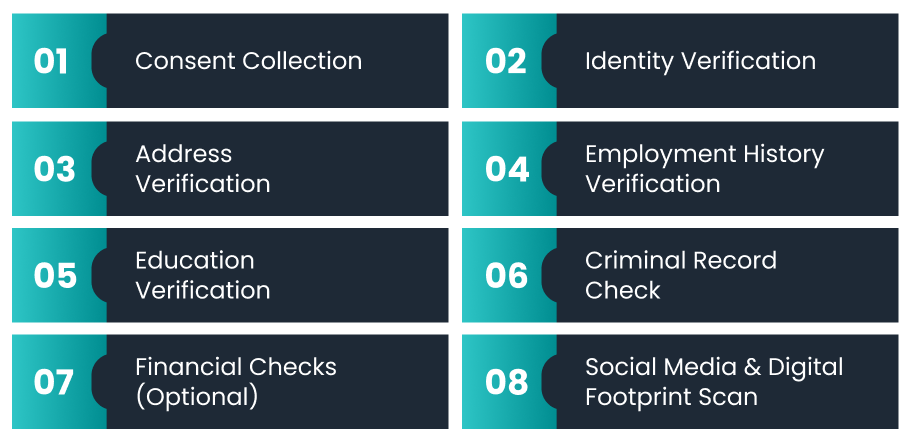Table of Contents
ToggleBackground Verification Process in India: A Detailed Overview
Trust forms the cornerstone of every successful business relationship—particularly when hiring new talent. As remote work becomes more common, the gig economy expands, and instances of resume fraud continue to rise, employers across India are placing greater emphasis on a robust background verification process to ensure the credibility and integrity of their workforce.
According to a 2023 study by NASSCOM, nearly 18% of resumes in India contain discrepancies, ranging from incorrect education credentials to fake employment histories. In such a climate, comprehensive and efficient background verification isn’t just a good-to-have—it’s an absolute necessity.
As one of India’s leading background verification platforms, OnGrid enables organisations to streamline and scale their screening processes. In this blog, we dive into the background verification process in India, its various components, the technologies driving it, regulatory frameworks, and why it’s more critical now than ever.
Also Read : Stop Fraud Before It Starts: The Power of Background Verification
Why is Background Verification Important?
Before diving into the process itself, it’s important to understand why companies invest in background checks:
Mitigate hiring risks: Fraudulent candidates can cost a company time, money, and even reputation.
Comply with regulatory obligations: Sectors like BFSI, healthcare, and education require mandatory checks.
Ensure workplace safety: Verifying criminal records reduces the risk of workplace violence or misconduct.
Protect company data: Especially relevant in sectors with access to sensitive customer or business data.
The Background Verification Process in India: Step-by-Step

The background verification process typically begins after a conditional offer of employment is extended. While the scope may vary by role and industry, the core components remain consistent.
1. Consent Collection
Under Indian law (including the IT Act, 2000), explicit written or digital consent is required before conducting any verification. Platforms like OnGrid ensure secure, consent-based processing with full audit trails.
2. Identity Verification
Verification starts with validating identity documents, usually:
-
PAN card
-
Voter ID
-
Passport
With digital APIs and Aadhaar-based eKYC, platforms can complete this step in real time, reducing the dependency on physical documents.
3. Address Verification
This includes current and permanent address checks. Digital address verification using OTP-based Aadhaar authentication or geo-tagged video verifications are replacing legacy door-to-door models.
According to OnGrid data, digital address verifications have cut processing times by up to 80%, while maintaining accuracy.
4. Employment History Verification
Employers verify:
-
Tenure of past employment
-
Designation
-
Salary details (if needed)
-
Reason for exit
Many companies today use automated integrations with HRMS platforms, or verified employee databases (like EPFO or NSR), to validate work histories.
5. Education Verification
Institutes or universities are contacted directly or through third-party databases like:
-
NAD (National Academic Depository)
-
Digilocker (especially for CBSE and state boards)
Fake degrees remain a significant issue: a report by OnGrid revealed that 9.5% of education verifications conducted in India in 2022 had discrepancies.
6. Criminal Record Check
Criminal background checks involve scanning:
-
Police records (both local and national)
-
Court cases via the eCourts portal
-
FIR records
Platforms like OnGrid have introduced eFIR integration and digital criminal checks that scan over 7000 district and subordinate courts to ensure no red flags go unnoticed.
7. Financial Checks (Optional)
Roles in BFSI or senior management may warrant checks like:
-
Credit Score (CIBIL/Experian)
-
Loan defaults
-
Bankruptcy records
This step helps assess financial reliability, especially in roles involving fiduciary responsibilities.
8. Social Media & Digital Footprint Scan
This modern add-on involves scanning public digital behavior—LinkedIn, Twitter, Facebook—for any content that may indicate:
-
Hate speech
-
Substance abuse
-
Violent tendencies
-
Extreme political views
This check, while optional, is increasingly used for leadership and customer-facing roles.
How Long Does the Verification Process Take?
Traditionally, background checks in India took 7 to 15 working days, depending on the depth and responsiveness of third parties.
However, OnGrid’s use of AI, OCR, and API-based integrations has brought this down significantly. With digital verifications, identity, Aadhaar, PAN, and even Udyam registration checks can be completed instantly.
On average, OnGrid completes over 70% of verifications within 48 hours, enabling faster onboarding and reduced dropouts.
Sectors Where Background Verification is Critical
While almost all industries now rely on verification, certain sectors stand out:
1. BFSI (Banking, Financial Services & Insurance)
RBI and SEBI mandates require robust screening, especially for roles dealing with money handling, KYC processes, and customer data.
2. Healthcare
Staff credentials and criminal records must be verified to protect patient safety. According to OnGrid insights, 3 in 10 healthcare verifications uncover some discrepancy.
3. Gig Economy & Blue Collar
With the gig workforce expected to reach 23.5 million in India by 2030 (NITI Aayog), background verification is vital for delivery partners, drivers, and security staff.
4. Education
Schools and universities are increasingly adopting staff verification policies to ensure child safety, often verifying teacher credentials, previous employment, and criminal records.
5. IT & Startups
Given the access to sensitive data and IP, startups are now mandating comprehensive checks as part of their onboarding process.
Legal & Regulatory Framework in India
Several laws and regulatory bodies govern background verification:
-
The IT Act, 2000: Mandates digital consent and data protection protocols.
-
Indian Penal Code (IPC): Defines consequences of document forgery or impersonation.
-
RBI Guidelines: Require customer-facing staff to undergo verification.
-
POSH Act: Encourages companies to vet employees to prevent workplace harassment.
With the anticipated Digital Personal Data Protection Act (DPDP) being enforced soon, companies will need to tighten compliance on how they collect, store, and process personal data.
Common Challenges in the Verification Process
Despite advances, companies still face several hurdles:
Unresponsive institutions delaying education/employment checks
Lack of standardised databases for criminal records
Fake documents that bypass basic checks
Manual verification models still used by many vendors
OnGrid tackles these issues with multi-source verification, real-time APIs, and an AI-powered anomaly detection engine to flag inconsistencies.
How OnGrid Is Revolutionising the BGV Space
OnGrid is not just a verification company—it’s a technology-first, consent-driven trust platform. Here’s how OnGrid stands out:
API-first platform with plug-and-play integration
Digital address and ID verification with geo-tagged, timestamped records
Instant document verification using OCR and facial match
Secure, user-consented framework aligned with India’s data protection mandates
Comprehensive dashboards and analytics for HR and compliance teams
OnGrid has completed over 100 million verifications across 30+ industries and is trusted by leaders in fintech, edtech, healthcare, logistics, and more.
The Future of Background Verification in India
The future is undoubtedly digital, real-time, and AI-enabled. Here are key trends to watch:
Blockchain-based tamper-proof credentialing
Predictive analytics for fraud detection
Video-based KYC and address verifications
Unified government databases to streamline checks
Self-sovereign ID frameworks where candidates manage their own verification trail.
With platforms like OnGrid leading the charge, India is well on its way to building a trust-rich digital workforce ecosystem.
Conclusion
The background verification process in India has evolved rapidly—from a paper-driven, slow-moving task to a high-speed, digital trust engine. As the workforce diversifies and remote work becomes the norm, the need for efficient, scalable, and secure verification processes has never been greater.
OnGrid empowers businesses to make smarter hiring decisions by providing end-to-end background verification solutions that are fast, compliant, and reliable. Whether you’re onboarding a delivery executive or a CFO, your verification journey starts here.
Ready to build trust at scale? Explore OnGrid’s BGV solutions today.





Leave a Reply